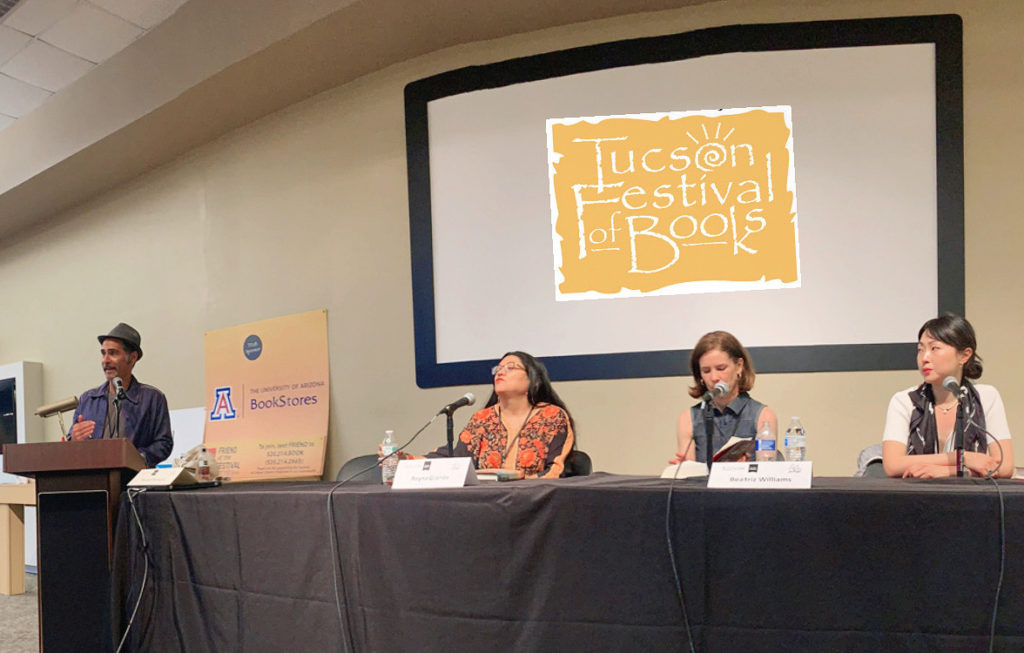Hosting Viet Thanh Nguyen on a panel was one of Stuart’s highlights of the Tucson Festival of Books…for the decade. Viet is witty, humble, and brilliant–all qualities that shine through his most recent work, the memoir, A Man of Two Faces.
Stuart tried to take good notes on some of Viet’s best answers to the questions he patiently endured. We hope you enjoy his company half as much as we did.

SH: In your book, you trademark the American Dream™. You’ve also said that Hollywood is the unofficial Ministry of Propaganda for America™. At what point in the writing process did you realize that this branding was going to be such a central organizing principle for your work?
VTN: As serious as the subject matter of the book is, I think it’s also really playful. I had a lot of fun writing the first two thirds of this book. Two things in my life really set the context for this, one is that I read a lot of contemporary poets of color. In writing about some of them, you read their work, you feel very serious things; however, they’re very playful at the level of language. They use the typography, they rearrange words on the page, to emphasize certain things they’re trying to discuss. Prose writers are not allowed to do that. I don’t know why. Poets can do whatever they want. So I wanted to capture in the writing of this book some of the playfulness I found in these poets. The playfulness is also serious at the same time because they’re using the playfulness to again emphasize certain kinds of aesthetic or political/personal issues.
So I just let myself go, and it felt right in talking about America. Many people probably routinely say “America” without thinking twice. No matter your politics, we have probably internalized to one degree or another the power of American mythology. To even say the word “America” already implies so many things that many of us take for granted. I wanted to make sure that when people saw the word America, they stopped and had to think about what the very meaning of that word is.
SH: You’ve discussed how being a model minority, you have to express your gratitude by successfully validating the American Dream™. Is that something that you’ve fought against, that you have to constantly guard against? Or did you never really think you were going to fall prey to it?
VTN:I’ve read a lot of Asian American literature, a lot of so-called “ethnic memoirs” and “ethnic autobiographies.” I think I have a pretty good idea about how it is that a minority or a person of color is supposed to tell their story in the United States. I can give you a five step program of how to write an ethnic bestseller, in case you’re interested.
I’m not interested in telling that story. I’ve seen it 1,000 times and I know exactly how it’s going to be interpreted. Basically the situation is that Americans are perfectly willing to accept that the United States treats its immigrants kind of harshly, that we had a complicated history, we’ve had an imperfect union; however, the arc of history is inevitably going to make us perfect. “It’s too bad that your immigrant parents or grandparents had these travails, but look at you!” I wanted to make sure that even if I told my family’s story–because it is a meaningful story, a powerful story, an emotional story–that I wasn’t going to let the readers off the hook in terms of allowing readers to turn back to the standard American mythology within which so many of our stories are contained.
SH: You’re talking about not letting the reader off the hook. Your book contains a pretty good skewering of what you call the “quiet American.” We’ve got the quiet American and the “ugly American.” The “quiet American” is the polite, sensitive person who’s appreciative of multiculturalism but still sort of endorses special ops blowing up innocents with drone strikes, or at least doesn’t do anything to oppose it. As my 18 year old daughter would say, “I feel attacked.”
VTN: There are different ways in which writing can provoke and writing can entertain. We’re not supposed to educate in contemporary American prose. One of the standard cliches of writing is “show, don’t tell.” That’s perfectly fine; it works in a lot of contexts. But sometimes I’m also really interested in telling.
When I’m writing memoir, I’m certainly aware of show, don’t tell. I’m aware of the compulsion to reveal the secret, to reveal the trauma. I mean, why would you read someone’s memoir unless there’s something traumatic? “I had a great life.” “Oh okay, good!” I’m more than aware of all the formulas I can choose to work with. But I am also turned on by provocation, by satire—all those things are art forms to me as well. I think you can, in fact, provoke, entertain, educate, satirize all within 10 or 15 pages.
SH: This book represents a shift in genre for you. You have had great success with your novels, and a lot of times I think that success can potentially get you stuck. It can make you feel like: “I’m a hero and I’m going to stay here.” But you switched positions, to use a baseball analogy, and you started working in a different genre.
VTN: One of the themes of A Man of Two Faces is about coming to the point where I’m able to trust my own intuition and my own rhythm and my own internal voice. Because I grew up raised by very devout Catholic parents who are also Vietnamese which meant I was extremely repressed. Then I went to get my PhD in English which means by repression grew even deeper. Self-repressed is really good for being an academic. It’s not so good for being a writer. So for me to become a writer was about trying to identify where that repression was, where it was coming from, and how to lift it off in order to give access to this voice inside–which also has become increasingly a childlike voice. I if you read the book, there’s a lot of political critique and obscenities and things like that, but it’s all born from the spirit of getting close to that child who’s willing to speak the truth as they believe in it without worrying about what the adult or the authority or the culture at large is going to say.
Audience member: I wonder if you would tell us, other than family members, who has been most influential in your life and why?
VTN: It would have to be my partner, my wife. When I told her I was writing this memoir, what she said was, “Don’t write about me.” She reads everything I’ve written. So I finish the book and I give it to her and she reads it and she says to me, “Why am I not in the book?” So the penultimate chapter of the book is, in fact, something I wrote after that. She said, “I think you really need to write about your and my nuclear family.” Not because she wanted to be in the book per se, but she was right. Becoming a husband, becoming a father, was crucial to myself as a person and myself as a writer as well.


